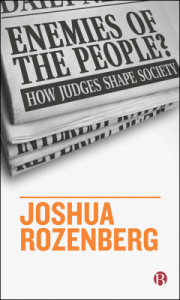This article was originally published on A Lawyer Writes.
Liz Truss was lord chancellor and secretary of state for justice from July 2016 to June 2017. My book Enemies of the People? — published in April 2020 — took its title from the famous Daily Mail headline in November 2016 that defamed three senior judges for ruling that Brexit could not be triggered without legislation:
Here is a passage from the book:
“The three judges… looked to the government for support. In decades gone by, the lord chancellor would have spoken on their behalf. But that great office of state was then occupied by Liz Truss MP, who was something of a political lightweight. Nothing was heard from her for a couple of days, presumably because she was waiting for instructions from Downing Street and nobody in the prime minister’s office grasped the dangers of delay. Eventually, Truss expressed the view that judicial independence was “the foundation on which our rule of law is built”. When pressed, she said it was not for her to condemn the newspapers.
Indeed, it was not. But what Truss was being asked to do was to defend the independence of the judiciary, in line with the oath she had taken on her appointment. As the judges saw it, that meant explaining that they had been traduced in the media. Truss’s response was condemned by Lord Judge, the former lord chief justice, as “a little too late and… quite a lot too little”.
A couple of years later, Lord Neuberger said that Truss had completely missed the point. She had been free to criticise the press and she should have done so. But Neuberger, who by then had retired as president of the Supreme Court, was in forgiving mood.
“In fairness to her, she was a very recent appointment. She had had no experience of the rule of law and of the judiciary,” he said. “It was unfortunate, and she should have got it right, but I think there were… mitigating circumstances.”…
Lord Dyson, who before his retirement was the most mild-mannered of judges, was still incandescent when he wrote, in a memoir published two years later, that Truss’s 11 months in office had been “disastrous”…
The European Union (Notification of Withdrawal) Act 2017 was passed unamended by parliament in March of that year. MPs voted at third reading by a majority of 494 to 122 in favour of the legislation. At one level, this took the heat out of the controversy. But it also allowed the lord chief justice to speak more freely.
Lord Thomas had not taken kindly to Truss’s assertion that the judges should have responded to the newspaper criticism themselves. That was what she seemed to be saying when she told the House of Lords constitution committee that there was still a “myth” surrounding the so-called Kilmuir rules. “Those rules about judges not being able to speak out in public were abolished in the 1980s,” she reminded them, “and yet there is still sometimes a reticence to do so.”
Three weeks later, it was Thomas’s turn to give oral evidence. “The idea that we do not realise that the Kilmuir rules have gone is quite frankly fanciful,” he told the peers. What Truss had not understood, the chief justice implied, was that no serving judge could have responded to the Daily Mail at that time without plunging the judiciary into political controversy. And some readers had believed what they read. “The circuit judges were very concerned,” he added, “because litigants in person were coming and saying, ‘You’re an enemy of the people’.”
These threats had been taken very seriously: Thomas confirmed that the Miller hearing was the only occasion in the whole of his judicial career when he had felt the need “to ask the police to give us a measure of advice and protection in relation to the emotions that were being stirred up”.
Asked about Truss’s insistence that it was not her job to censor or direct the press, Thomas insisted that she was under a duty to defend the judiciary from unwarranted attacks. “I regret to have to criticise her as severely as I have, but to my mind she is completely and absolutely wrong about this,” he said. “It really is absolutely essential that we have a lord chancellor who understands her constitutional duty.”
What though, about my part in her downfall? I suppose it was pulling my punches when I described her merely as a “political lightweight”. Writing those words in 2019, I thought Truss might possibly mature into a heavy hitter, someone who could even have gone on to lead the country. So I gave her the benefit of the doubt.
I’m not seriously suggesting that if I had been more critical of her it would have made any difference. But who knows what might have happened if more Conservative MPs and party members had listened to the judges?
Joshua Rozenberg is an honorary Master of the Bench of Gray’s Inn and a non-executive board member of the Law Commission. He was the BBC’s legal correspondent for 15 years before moving to newspapers. He now presents the popular Radio 4 series Law in Action, which he launched in 1984 and appears regularly on other news networks in the UK and abroad.
 Enemies of the People? How Judges Shape Society by Joshua Rozenberg is available on the Bristol University Press website. Order here for £14.99.
Enemies of the People? How Judges Shape Society by Joshua Rozenberg is available on the Bristol University Press website. Order here for £14.99.
Follow Transforming Society so we can let you know when new articles publish.
The views and opinions expressed on this blog site are solely those of the original blog post authors and other contributors. These views and opinions do not necessarily represent those of the Policy Press and/or any/all contributors to this site.
Image Credit: Blu Inc Bristol


